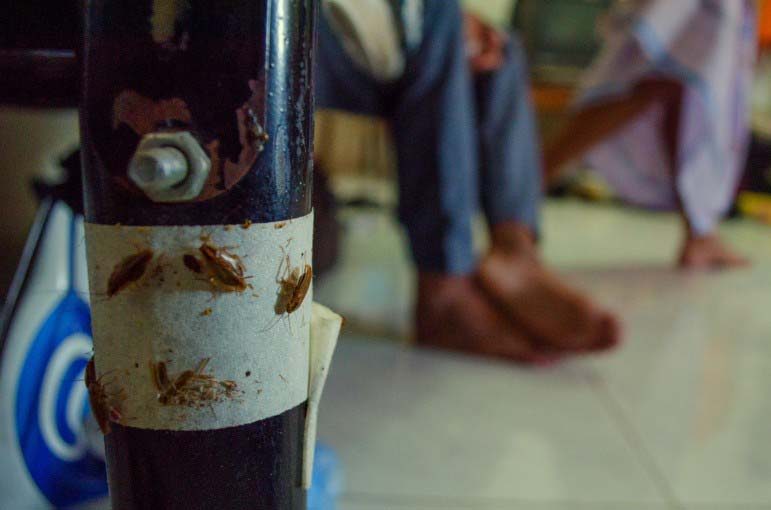
Labor inspectors in Qatar tasked with monitoring the living conditions of workers here have been documenting more than two dozen infractions each week, newly released statistics show.
On average, investigators are finding more than one transgression during every inspection they conduct.
That’s according to a tally of figures released monthly by the Ministry of Development, Planning and Statistics, which provides one of the most detailed breakdowns on enforcement activities to date.
Between March and August, the government conducted 709 inspections of labor accommodations and found 827 violations.

The inspections come as the living and working conditions of laborers in Qatar is being intensely scrutinized as the country ramps up construction of major transportation projects, infrastructure and stadiums ahead of the 2022 World Cup.
Additionally, inspectors reported 180 cases of “enforced evacuation of labor accommodations,” although it’s not clear what precise action was taken.
While no details were released about the nature of the offenses, problems with workers’ accommodations in Qatar have been well-documented by several human rights groups.
Overcrowding, lack of clean water, mold, broken air conditioners and bunk beds – a violation of local laws – were observed by Human Rights Watch officials in 2012.
Last November, François Crépeau – the UN special rapporteur on the human rights of migrants – shared similar observations, saying after one visit to a labor camp that the “whole setting was a dump.”

Over the past year, the Qatar government has promised to introduce stricter accommodation standards for workers, as well as hire more labor inspectors.
However, experts say simply recording violations and introducing new rules is unlikely to improve the living conditions of the country’s growing blue-collar population.
“A lot of the laws here are very good,” Nick McGeehan, a researcher with Human Rights Watch, told Doha News.
“But what is happening if there are widespread violations? Are (employers) being prosecuted in a timely fashion? Will the workers be compensated?”
McGeehan said employers and labor camp operators need to clearly understand the country’s laws and what is expected of them. Additionally, they need to face consequential penalties for violating the rules, which would act as a deterrent, he said.
There have been few, if any, disclosed cases of enforcement action against labor camp operators in Qatar.
“(The authorities) need to prosecute individuals and hold them to account,” McGeehan added. “We’d like to see evidence of progress.”
Behind the numbers
The country’s labor accommodations investigators appear to be busy, conducting an average of 3.85 inspections a day.
However, McGeehan said those figures immediately raise more questions, such as whether the inspections were random or were following up on complaints. Additionally, he said he’d like to know what became of the citations – nearly 4.5 were recorded each day – and what penalties were levied.
Human Rights Watch asked the Ministry of Labor to explain the steps inspectors take when they find housing violations as part of the advocacy organization’s research behind its 2012 report. Government officials did not directly respond to the question, saying only that there are minimum standards in place that are subject to inspection.
The location of many housing camps for blue-collar expats has also been problematic.

Thousands of men working here without their families have been shifted from Doha to the Industrial Area in the past three years, following the implementation of a 2011 ban on working-class “bachelors” that stopped them from living in residential neighborhoods.
Following several visits to Qatar, McGeehan said he was struck by how “ramshackle and makeshift” many laborer accommodations appear, particularly in the Industrial Area.
“They are in the middle of concrete factories and garages. It’s not a residential zone … (and) it doesn’t seem to be particularly healthy.”
However, developers have been constructing more purpose-built accommodations for workers.
One of the largest examples is Barwa al Baraha, which was scheduled to open this summer and eventually house some 53,000 individuals when the sprawling complex is fully completed.

However, a typical bedroom on the site is designed for six people and furnished with three bunk beds, which appears to be inconsistent with current accommodation standards. Still, a Barwa official previously told Doha News that “whatever the government standards are, we’ll abide by it.”
Adding to problems about the quantity and quality of labor inspections and accommodations is a looming housing shortfall for workers.
The impending lack of rooms could put pressure on employers to try to squeeze more workers into already overcrowded accommodations.
Locally based Al-Asmakh Real Estate Development recently projected that the country would need more than 500,000 additional beds for laborers in the coming years for the country’s growing work force.
However, by its calculations, the labor camps planned and under construction can only accommodate 100,000 additional individuals.
Here’s a copy of the August report released by the MDSP:
Thoughts?







